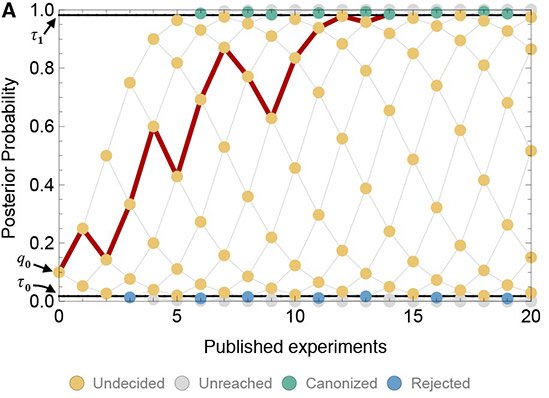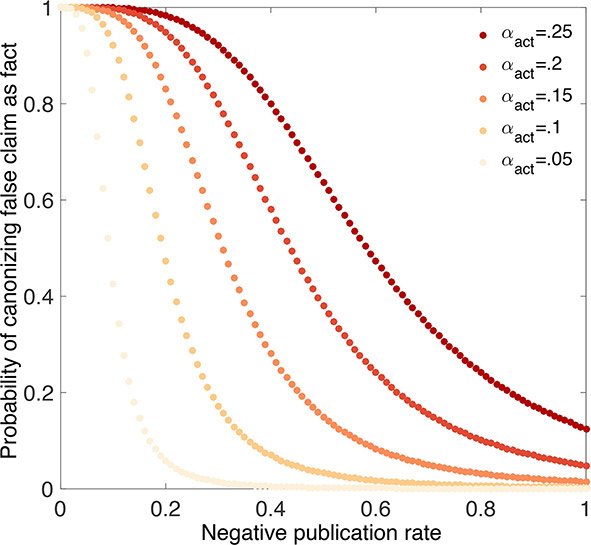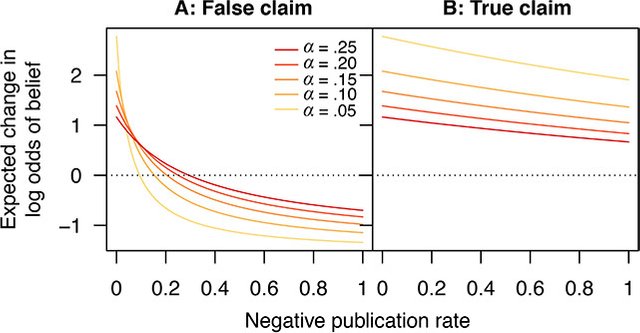Scientific 'Facts' Could Be False - Science's Replication Crisis
Does science always get things right? What happens when something published is wrong? Sometimes it's never corrected because it has the weight of authority of being published which grounds it into the scientific community.
The scientific community is facing a "replication crisis" from an inability to replicate certain experimental findings which indicates a likelihood of them being false. Unless enough negative results are published, false claims can frequently become "canonized" as fact and remain hardened in the scientific community. Some disciplines of study are more affected than others.

The likelihood of a hypothesis being true or false moves up and down a ‘ladder’ as more and more experiments on the hypothesis are published
Science Tackles Science
Silas Boye Nissen of the Niels Bohr Institute, University of Copenhagen, Denmark, and colleagues from the US, wanted to explore the process through which a claim becomes a fact. They carried out research and the results were published in eLife Sciences today under the title "Research: Publication bias and the canonization of false facts"
Experiments will give positive results to confirm a hypothesis, or negative results that do not confirm a hypothesis. However, scientific journals tend to prefer to publish positive results from new research. False claims, either knowingly or unknowingly made, can persist as a result of them being regarded as true facts simply because they are published.
The scientific methodology can be generally understand as a process where you ask a question or make a statement that something will happen or is true, figure out a way to test it and find an answer that validates or invalidates what you suggested, carry out the experiment and observe what happens as results, and then develop theories or conclusions about what happened in order to get a better understanding of the natural world.

Silas Boye Nissen
All of this can then get submitted to a scientific journal for publication. Experiments are often not 100% definitive, as they report results of observations and form conclusions from those observations. It's possible that running the experiment again would have slightly different results or observations. A hypothesis can be most likely true, most likely false, and also have a certain percentage of false positive or false negative results.

source
Canonization
Normally in scientific research, certain claims that are significant are further verified through experimentation which determines their stability and veracity. This leads to widespread acceptance of the claim as being true. It ceases to be a claim and becomes a fact. But this process of canonization does not always function so well.
Canonization can have the following characteristics:
- a canonized fact can be taken for granted rather than treated as an open hypothesis in the subsequent primary literature
- tests that do no more than to confirm previously canonized facts are seldom considered publication-worthy
- and canonized facts begin to appear in review papers and textbooks without the company of alternative hypotheses
Facts Revised
Purported facts can always be reviewed and verified further, but for the time being the issue is considered settled once it reaches the phase of canonized fact in the scientific community.
The authors of the paper make an interesting remark: that we consider facts as facts because of their acceptance by the relevant community that establishes them as such, not necessarily because it accurately represents and reflects objective reality as it is.
This is a problem not only for the scientific community, but also for the community of humanity. Our deep desire for unity, harmony, getting along and having people to trust in for survival by not upsetting them, can get in the way of an honest assessment of reality. Groupthink is extremely powerful. Dan recently covered some of the issues with consensus forming.
Positive Preference
Part of the research done in this study included an analysis of 74 studies for 12 antidepressants, where 37 out of 38 submitted positive results were published. Only 3 of the 24 submitted negative results were published. And get this, 8 of the submitted negative results were reformulated as positives. This means that studies with a negative result were only published at 10% of the rate of positive results being published.

Publishing negative outcomes is essential for rejecting false claims
Bring on the Negative
In our efforts to determine the truth of reality, the negative is a welcome and necessary factor to provide a contrast and method of comparison to distinguish a false hypothesis or claim from true facts. According to the research, increasing the amount of negative results published about a claim by 20 to 30% will allow such a contrast and comparison to be made.

Scientific activity will tend to increase belief in false claims if too few negative outcomes are published
Without enough negative results published, as a result of scientific journals largely preferring to publish positive results and reject more negative results, it may lead to believing a hypothesis is true every time a positive result is published as it will eventually become declared as a fact. Negative results need to be published at a certain rate in order to detect false hypothesis is and prevent them from being considered as a true fact.
Closing Remarks
How people blindly accept published data reflects our current hyped up state of fakenews and "post-truth" the media is trying to condition people into accepting as a worldview. But we have long had publications being spread around websites as "facts", when they are not. It's not something new.
What is new, is the media creating a mind virus meme to propagate through society and convince people that only their (the mainstream news') information is the "real news". The media propagates false news all the time, and has been for decades, often knowingly.
The battle for information access is going to rev up as more mainstream pressure is put onto public consensus formation to censor information sources that are not "verified" or "authorized".
Alternative media and platforms to ensure viability of data have never been in more need to exist than now. Steemit has arrived at the right time.
Thank you for your time and attention! I appreciate the knowledge reaching more people. Take care. Peace.
References:
If you appreciate and value the content, please consider:
@krnel
2016-12-20, 4:03pm

Thanks, @krnel, for this clear and compelling description of the problem.
My personal approach to this problem is to look at new things with a balanced mind - open and skeptical at the same time. I must admit, however, that at times this makes me come across as credulous. However, I'd rather be at least open enough to investigate and experiment; to do further research and to test results for myself.
My long-range hope in all of this is to break out of any false paradigms, and to find and exploit "new science" leading to new and beneficial inventions that will bring value into the world.😄😇😄

Thanks for the feedback. Appreciate your vision.
Upvoted and resteemed!
Thank you @krnel for this post.good work.regards
That's why in particle physics, we have always (at least) two independent experiments.
A scientific fact should however never be taken for granted. With the evolution of knowledge, new data, etc, what is true today may become partially true tomorrow or even wrong. This is what science is, after all. I am not sure this applies directly to the fakenews business, as here, it is difficult to me to call a 'fact' a 'fact'. We always have some interpretation on top of it and one must be careful with what we read.
Indeed, that's why proper science is great, continually self-correction in light of new evidence. It ties into fakenews through conses formation, as I have said. Publications are spread around and consensus forms in the public.
In biology as well, even then sometimes things are only replicable in one groups hands. For an example where that is happening right now see Natronobacterium gregoryi Argonaute, the protein was published to have interesting properties, but nobody can replicate it.
This is the media controlling science. Scientists need funding and a bit of positive press goes a long way; it seems like every week on the mainstream media we see another cure for cancer just 5-10 years away.
One thing you can do if you arent a scientist is keep a skeptical but open mind. Also provide your resources to help science so funding is less of an issue, contribute a little brain time to Zooniverse, and/or some of your computer time to BOINC. You can even earn Gridcoin for your effort.
We (scientists) are trying to increase our personal outreach efforts to help with this. When you have more people actually explaining the work to regular people, the clickbait headlines in the news about these things have less of an effect. Since people already understand the work some.
The original purpose for journals like PLoS ONE was to give scientists an avenue to publish replication studies. To make doing that have more impact. However I don't see too many of those studies coming out of PLoS ONE. This is indeed a problem and one where we should collectively be going back and figuring out what is fact and what was a function of poor experimental design. It's difficult to make progress when you are basing your experimental design on flawed data. Any time I have come across mistakes in the publication chain I have corrected what I found with in one of my papers. Aka publiched something and repeated a prior experiment set (which was relevant) and reported what difference I saw compared to what was previously available
Getting to reality is a battle hehe, thanks for the feedback.
Scientists are the high priests of our era and so they act in a similar fashion to medieval or earlier priests -- pontificating and conducting inquisitions. It is more subtle today but the effects are the same as the desired result is to control the dialog and thereby control the population. A lot of theory is reported as fact. We need discernment to see when theories are no longer useful and thus keep searching for new and more practical ones.
There may be some exceptions but I dont think the scientists are doing this manipulation, its the media.
I agree, there are many parallels. Thanks for the feedback.
Scientists are not, your blame is a bit misplaced. Scientists by and large just want to understand stuff. It's those who interpret the work for people in your news that are trying to create the us vs them mentality, and to get people to take hardened sides. I certainly don't agree that scientists are modern day priests, I am not at least. Just a guy who wants to learn cool stuff about how cells work, and who wants to help people deal with the crazy amount of disinformation I see from the reports on scientific work.
Okay I'll admit some scientists are cool and some are 'priests'. The priests are just getting a lot more publicity.
edit: I should have mentioned the source of the priest analogy is from Tom Campbell's book My Big TOE (Theory Of Everything) He goes into a lot of detail on the subject.
This is Very True on Wall Street!
There are many articles written about stocks on Wall Street. Common advise like buy stocks with low P/E (Price/Earnings) ratios, buy growing companies or buy companies liked by analysts fails to produce above average returns for the typical investor. Utimately, some of these methods work in certain markets, or at some periods or time, but there is very little publicized research that shows something that really "works." This may well account for investor returns and investment management returns, which typically underperform the market as a whole. (The brokers get to enjoy nice boats with high trading fees.) Very few people do their own "true" (scientifically valid) research. There is a little truth to each of these varibles. I recall one article which had conglomerated about 200 variables, each of which had a 0 to about 2% correlation to stock returns. Most of these variables had 0.5% to 1% correlation. Such a correlation shows some value, but ultimately is worthless as far as being an effective investment tool. Most "research" sent out by investment houses is purposed with "selling" stocks to investors. Brokers make money when you invest so calling you up and telling you their research analysts found a value is solely to get you to buy so your generate a commission.